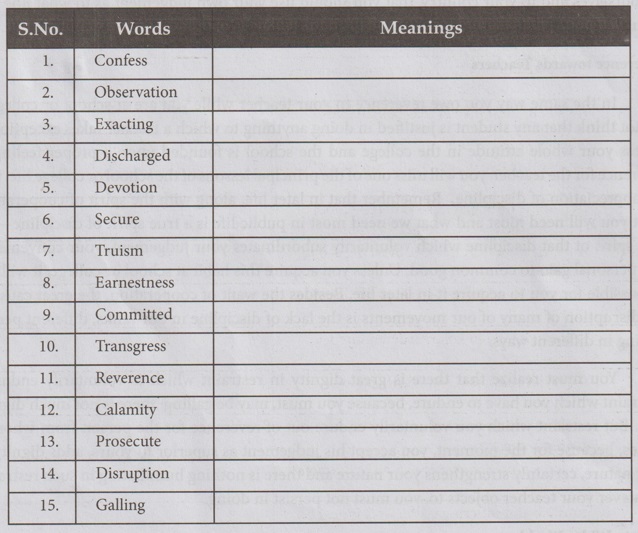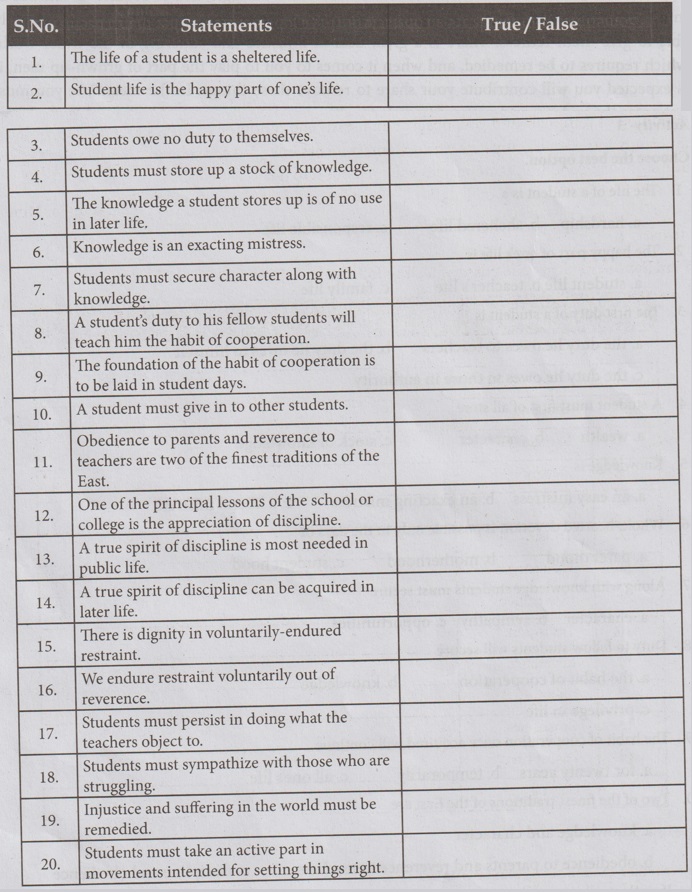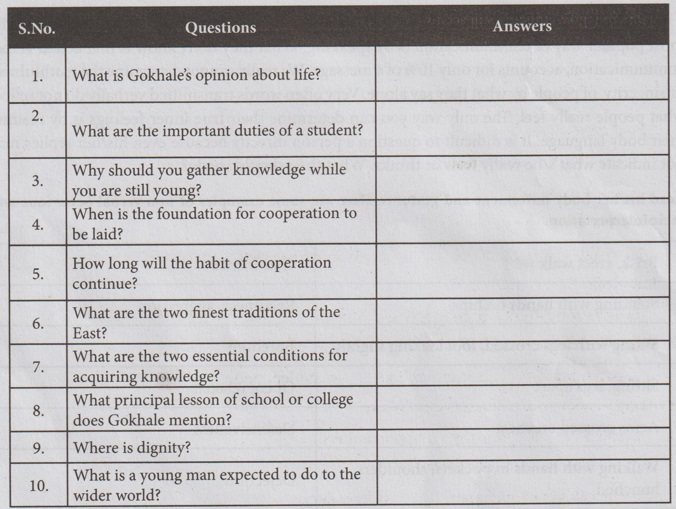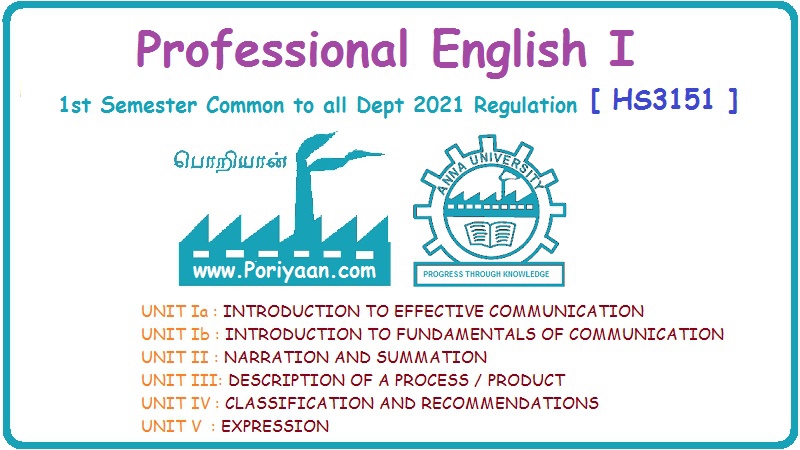Professional English I: Skill 3: Introduction to Effective Communication: Reading
Passage 1: Students and their Duties
Reading | Professional English
It is imperative that students possess a sense of direction in order to take on the challenges of the day.
PASSAGE- 1-
STUDENTS AND THEIR DUTIES
-Gopala Krishna Gokhale
It is imperative that students possess a sense of direction in order to take on the challenges of the day.
The following passages are extracts from Gopala Krishna Gohale's address presented by him for students of Madras (now Chennai) on 25th July, 1911. Gokhale's advice to students is remarkable for its clarity and relevance. Those who follow the advice will, no doubt, find it a stepping stone to success.
When I was a young man and a student like yourself, I often heard elderly men saying that the days of student life were in some respects the happiest days of one's life. I confess that I was not in those days quite able to understand where happiness lay, -- whether in the exacting demand which the teachers made on the student or in the succession of examinations or other hardships with which you all and every student elsewhere is familiar. However, since I began what may be called my later life and saw much of the world outside I began to understand and now I understand more and more every day the deep significance and the meaning of that observation. The life of a student is, comparatively speaking, a sheltered life. Gentleman, because this is the happy part of your life, there are therefore certain responsibilities attached to it which must be well discharged by you, because no privilege in life is worth having, unless it is attended by corresponding duties and there are certain duties, which those who placed you in your present position expect you to perform.
Duty to Yourselves
I will consider these duties under four heads. First of all, the duty you owe to yourselves; then there is the duty which you owe to your fellow-students; the third duty is the duty which you owe to those in authority over you, and the last duty is a duty which you owe to those who are around you, not students, but people of the wider world around you. If you consider these four duties one by one, and if you realize what is exactly expected of you in regard to every one of those duties, if you do the best that lies in your power to perform these duties properly, then you may well say for yourself that you can give a good account of your student days.
First, as regards the duty to yourselves: the duty is twofold. You have first of all to lay by a stock of knowledge that will suffice you not merely for your examinations but will be helpful to you in later life. Those who have to attend to their studies at a school or a college often try to acquire knowledge as they get along, but they have to struggle with the fact of the performance of other duties. Knowledge is an exacting mistress; she needs devotion, whole-hearted on the part of the person who seeks her. Such whole-hearted devotion is possible only in the days of student hood. Therefore, the first part of the duty towards yourselves is to take the utmost advantage of your present position, to lay by a stock of knowledge that will be useful to you in later life.
Importance of Character
But it is not merely knowledge that will help you or help any class of human beings by itself. Along with that knowledge there is another requisite that you must secure, and that is character. It is almost a truism to say that more depends for success in life on character than on knowledge. This character must show itself in earnestness, in energy of action and in high and generous sentiments being brought to bear upon the discharge of your duties and in recognizing what is due to others and what is due to yourselves. You have to acquire a character which will raise the whole life of the people amidst whom you move and for whom you are expected to work.
Duty to Fellow Students
Your duty to your fellow students will teach you in later life and will secure for you the habit of cooperation. The foundation of the habit of cooperation is really to be laid in our student days. This habit of cooperation you can acquire and acquire in a very marked manner, during your school or college days because you are trained to be together in your class, and you cannot have it all your own way if you want to get on with your class. Therefore, if you use your opportunities properly, you will know exactly how to get on with them by sometimes giving in to them and sometimes standing out for your own view, being regardful of the feelings and considerations of other people. This habit of cooperation once acquired will continue with you all your life. It is not easy to acquire it in later life if you have not already acquired it in your student days.
Duty to Parents and Teachers
Your third duty is towards those in authority over you. There are, in the first place, parents and guardians, and in the second place, teachers to whose care you are committed and, lastly, the authorities under whose rule you have to live. You must carefully realize what your duties are in regard to these authorities and not transgress these duties while you are in the stage of student hood. Two of the finest traditions of the East which have been universally recognized are obedience to parents and reverence to teachers. This is a recognition made not only by the people of the East, but also by the people of the West and I should be extremely sorry, and I should consider that it would be nothing less than a national calamity, if either the one or the other of the two traditions is seriously weakened in this land. Obedience to parents, especially during the time of the student hood and reverence for teachers while you are studying under them, these are two of the most essential conditions necessary for acquiring knowledge and for taking the fullest advantage of those opportunities which are placed within your reach while you are students. While you are young men and students, while parents have to find means wherewith to enable you to prosecute your studies, while they have to take care of you, it is necessary that their wishes should prevail with you in all matters, but when once your education is completed and the struggle of life commences and when you are able to stand on your own legs, you owe it to yourselves and to your country, that you should use your own judgement as to what line you should adopt and what work you should do.
Reverence towards Teachers
In the same way you owe reverence to your teacher while you are at school or college. I do not think that any student is justified in doing anything to which a teacher takes exception... Unless your whole attitude in the college and the school is founded upon a proper feeling of reverence for the teacher, you will miss one of the principal lessons of the school or college life, viz., the appreciation of discipline. Remember that in later life, along with the spirit of cooperation, what you will need most and what we need most in public life is a true spirit of discipline—the true spirit of that discipline which voluntarily subordinates your judgement, your convenience and personal gain to common good. Unless you acquire this habit at school or college, it will not be possible for you to acquire it in later life. Besides the want of cooperation, the great cause of the disruption of many of our movements is the lack of discipline in our ranks, different people pulling in different ways.
You must realize that there is great dignity in restraint which is voluntarily endured. Restraint which you have to endure, because you must, may be galling; there is not much dignity in it. But restraint which you voluntarily endure out of reverence for the person from whom it comes, because for the moment, you accept his judgement as superior to yours, adds dignity to your nature, certainly strengthens your nature and there is nothing humiliating in such restraint. Whatever your teacher objects to, you must not persist in doing.
Duty to Wider World
The last duty that you owe to those who are in the wider world is to acquire a knowledge of their needs, observe their condition and observe their struggle, and to acquire an attitude of mind, so as to sympathize with those who are struggling, even though you are not immediately able to give them redress. There is a great deal of injustice and suffering in the wider world which requires to be remedied, and when it comes to you to play the part of grown-up men, it is expected you will contribute your share to remove these things. In the meantime you must not enter the wider world without knowledge. You are not only justified by bound to study the condition of things around you, observe and study the condition of things around you, observe and study but not take any active part in movements intended for setting things right. Observe and study the conditions carefully, as you are bound to do.
- From The Hindu
Activity- 1
Find Synonyms from the passage for the following words:

Activity- 2
Say whether the following statements are True or False.

Activity- 3
Choose the best option.
1. The life of a student is a
a. hardship
b. sheltered life
c. responsible life
2. The happy part of one's life is
a. student life
b. teacher's life
c. family life
3. The first duty of a student is
a. the duty he owes to teachers
b. the duty he owes to himself
c. the duty he owes to those in authority
4. A student must first of all store
a. wealth
b. character
c. stock of knowledge
5. Knowledge is
a. an easy mistress
b. an exacting mistress
c. a liberal mistress
6. Whole-hearted devotion is possible only in the days of
a. parenthood
b. motherhood
c. student hood
7. Along with knowledge students must secure
a. character
b. sympathy
c. opportunities
8. Duty to fellow students will secure
a. the habit of cooperation
b. knowledge
c. privilege in life
9. The habit of cooperation once acquired will continue
a. for twenty years
b. temporarily
c. all one's life
10. Two of the finest traditions of the East are
a. knowledge and character
b. obedience to parents and reverence to teachers
c. discipline and obedience
11. If students obey parents and respect teachers, they can acquire
a. knowledge
b. wisdom
c. endurance
12. One of the principal lessons of the school or college is
a. disruption of movements
b. dignity in restraint
c. the appreciation of discipline
Activity-4
Answer the following questions.

Professional English I: Skill 3: Introduction to Effective Communication: Reading : Tag: : Reading | Professional English - Passage 1: Students and their Duties
Related Topics
Related Subjects
Professional English I
HS3151 1st semester | 2021 Regulation | 1st Semester Common to all Dept 2021 Regulation
